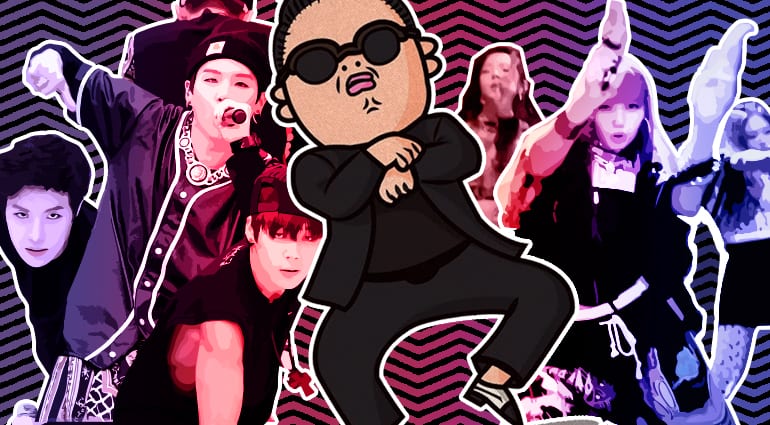
K-Pop (Korean Pop) has been on a rise, recently. From conquering the realm of social media (especially TikTok), to the expansion in the American music scene, this genre has been on the verge of international popularity for quite some time now. Let’s dive into it!
How and when?
K-Pop is one of the most trending topics since… years. But where did actually K-Pop stemmed from? The answer dates us back to 1992, when a 3-members boy band, Seo Taeji and Boys, performs in a live television contest in South Korea. They make something unique and barely seen up to that point in the country: a blend of Korean lyrics, Euro pop, African-American Hip Hop and Rap and a synchronised dance. Needless to say, the audience went wild – the judges, on the other hand, weren’t so impressed by it, assigned low marks and voted them off the show.
But the seed of revolution was already planted, and the hit song performed on TV, “I Know“, climbs to the top of the charts and stays there for 17 weeks. The rest is history, a history that leads us to the current state of K-Pop, a business that brings billions and billions of dollars to South Korea’s economy. Believe it or not, the world-known K-Pop band BTS reportedly cashed in $4.65 billion for the South Korean economy in 2019, and is currently worth 0.3 per cent of the country’s GDP.
You are currently viewing a placeholder content from Youtube. To access the actual content, click the button below. Please note that doing so will share data with third-party providers.
PSY conquers the world
K-Pop then slowly started to set the bar in South Korea and adjacent countries, while the world pretty much ignored its existence for almost two decades – that’s up until when a certain guy sang a certain song with a bizarre horse-riding dance… we’re talking about PSY’s GANGNAM STYLE, one of the biggest hits the world has ever seen (including breaking several records on YouTube as well, such as amassing billions of views for the first time in internet history). PSY’s success not only showed the world how much power the Korean music market had and how little people cared about the language sung in a song, but also that it was possible to impose and create something completely new and succeed, without “copying” pre-existent formats: PSY wasn’t a “Koreanized” version of a US popstar, it was just… PSY.
You are currently viewing a placeholder content from Youtube. To access the actual content, click the button below. Please note that doing so will share data with third-party providers.
The appeal of K-Pop was simple yet hard to replicate: having choreographed dances while singing isn’t exactly new in music (many pop stars used to do that in the ’90s), but the extreme dedication to the show and the visual aspect and utter perfection of movements was something that western culture wasn’t really used to: the cultural impact of a lifestyle that’s very much oriented to reaching perfection made its way into mainstream music.
Bear in mind that GANGNAM STYLE isn’t just a fortunate song turned into a hit by luck: it’s an extremely well crafted pop song, polished and produced by smart minds and manufactured to stick in your head from the first moment you hear it: it’s one of the many successful products of The Hit Factory, and we’re not referring to the recording studio where The Stooges recorded their songs 😉
BTS (방탄소년단) takes over
PSY was just a door opener for what was ready to come: the big comeback of boybands (and girlbands, of course). Currently there are dozens of K-Pop groups performing well in the United States & Europe, but nobody gets close to record-breaking BTS (BangTan Sonyeondan), a seven-member group of singers who’s taking the world over one hit after another.
Just to put it into perspective here, BTS managed to:
- sell-out Wembley (only 12 artists managed to do so in history)
- make Ticketmaster server crash by selling 3 million tickets within minutes
- amass 100 million views in barely 48 hours
- chart four no. 1 albums as fast as The Beatles
- & much more
You are currently viewing a placeholder content from Youtube. To access the actual content, click the button below. Please note that doing so will share data with third-party providers.
Keys of success rely on the quality self–produced music, flawless live performances and interaction with fans. BTS‘ branding goes further by having a nickname for their fanbase, which are called… ARMY (Adorable Representative MC for Youth), consisting of millions spanning various ages and cultures.
The K-pop industry has certainly seen a great growth before them, thanks to other artistes such as EXO, Blackpink, Tomorrow x Together and, of course, PSY. What once used to be a country-limited niche genre, later became an internationally popular one.
Life of a K-Pop star
K-Pop stars frequently have way different backgrounds than western pop stars: there’s a recruitment phase where kids (aged 10 to 14, sometimes even younger) approach agencies or get spotted by representative (usually because they look “cute“). If a kid gets chosen, s/he will sign a contract straight away. Up until a few years ago, K-Pop stars were bound to 13-years contracts, which have now been legally reduced to 7 after a few stars pointed out the unfairness of the length and the “slave-like” requirements of the contract’s terms and conditions.
Future stars then either sleep in dorms or at home and start to adhere to ultra-tight regimes: they wake up at 5 AM, attend choreography classes or vocal lessons, then they go to school until 3/4 PM, then back to the agency/company where they attend more lessons until 11 PM / midnight. Then back home (or to the dorm room), sleep for five hours and all over again the following day.
You are currently viewing a placeholder content from Youtube. To access the actual content, click the button below. Please note that doing so will share data with third-party providers.
It does sound like a nightmare by itself, and starts to look even more absurd if you take into consideration that these wannabe stars haven’t even debuted yet and they’ll have no certainty that they will, in fact, break through later in their life after years and years of training. Once a star is ready to debut and drop his/her first single, the management will monitor its success while the clock keeps on ticking more and more until the star becomes “irrelevant” or “old” to the audience. And right there, behind them, a long lineup of younger, ambitious and hard-working kids are ready to take their place. This leads to a state of intense emotional and physical stress which can be fatal.
Mental health issues are widely recognised (as of recently) in this “factory of talents” industry, including several singers who, sadly, took their lives because of extreme depression and struggles to manage fame.
My Final thoughts
K-Pop conquered the world thanks to an extreme attention to detail, solid investments and brilliant marketing. It seems like music has no place in the equation, which is not entirely true: those artists have to be treated and respected as any other “kind” of artist out there. There are tons of great singers and performers to discover in the South Korean music industry, many of them being not strictly K-Pop stars at all.
Discovering music from different cultures is an enriching experience and a sign of an open mind and good attitude towards music, which has no barriers. Having said that, the K-Pop phenomena is something both fascinating and scary at the same time: the glowing light of fame and the colourful representation of this genre may sound and look too fabricated to some, while the undeniably frail situation regarding “slave-like” contracts and unhealthy training regimen casts a shadow on the whole industry and leaves us with some important questions.
What do you think of K-Pop? Do you listen to it? Let us know with a comment!
9 comments
Leave a Reply
You are currently viewing a placeholder content from Facebook. To access the actual content, click the button below. Please note that doing so will share data with third-party providers.
More InformationYou are currently viewing a placeholder content from Instagram. To access the actual content, click the button below. Please note that doing so will share data with third-party providers.
More InformationYou are currently viewing a placeholder content from X. To access the actual content, click the button below. Please note that doing so will share data with third-party providers.
More Information





Aureliatulitu says:
Bts ,really something else:dance ,music,laugh and entertaiment,respect and all you need to make you feel good !!!
They are so open and amusing that you cannot pass without noticing !You even feel the need to learn korean and japanese!?❤❤❤❤❤❤❤❤❤❤❤❤❤❤❤
Antti Linnossuo says:
KIll yourself faggots or I’ll fucking splatter your brains
Ana says:
You must hate the world, none of these people have done anything to you, so why don’t you figure out your own emotional baggage before leaving a useless comment on a public platform. Simply judging while you don’t anything about them is ignorant, and if it’s because they’re Asian, then you’re just racist. Neither of which are good qualities.
Cliftoifton says:
good
vimla devi says:
You should talk about BIGBANG also, don’t forget that they created k-pop they brought everything to k-pop. They are the real legends and kings of k-pop ?
Beata says:
Thanks from one grateful English teacher from Poland 🙂
Some of my students have become obsessed with K-POP and I was looking for materials; now I have found this text I can feel one successful lesson coming up 😉
Cheers!
wanying says:
Let me introduce you to the popularization of Korean pop culture. “Korean pop culture can be seen as a mixture of Korean culture and other cultures, with the content of Korean culture packaged in an internationally popular way and with resources. Many “Korean Wave” products are a fusion of Western pop culture and traditional Asian culture, with Western pop culture as the external expression and Confucian culture as the internal content, which gives a sense of déjà vu to both Eastern and Western audiences, and also resonates with those who want to appreciate Western culture in the East. The “Korean Wave” should be seen as a result of the internationalization of culture, where culture flows in both directions rather than from high to low. In fact, since the 1980s, the Korean government has gradually opened up the entertainment industry to the international market, allowing foreign films and music products to enter the Korean market; through this policy, the competitiveness of the Korean local entertainment industry has been promoted and brought on par with the international top level, enhancing its international competitiveness.
jean says:
I recommend Koreatome.com for sending your kpop fans products! Very easy and cost effective for fans! ^^
Jessie says:
The influence of K-pop is increasing. K-pop is often mentioned in popular topics. Almost every year, there are hot K-pop songs that are popular with listeners in most parts of the world. I think these K-pop songs are popular because of their strong rhythm and catchy lyrics. The style of the work and the content of the lyrics have also changed a lot, which makes the audience feel fresh. In addition, the singer of the song is also an important factor. Many people around me, including myself, are K-pop fans. We all have our favorite idol groups. First, we were attracted by the idol group’s superior looks and passionate performance on stage. Learn about the work and life of these idols through various works and videos and be attracted by their personality charm. Their works and stages presence are also valued by fans. These group members not only have good looks, but also strong singing and dancing abilities, and they can sing and dance at the same time. At the same time, I think idol groups can provide a lot of emotional value to fans, and when watching K-pop related videos, fans can harvest the positive emotions that the idols output. K-pop is experimenting with various styles with the goal of expanding into the global market, hoping that they will bring more positive energy to K-pop fans.